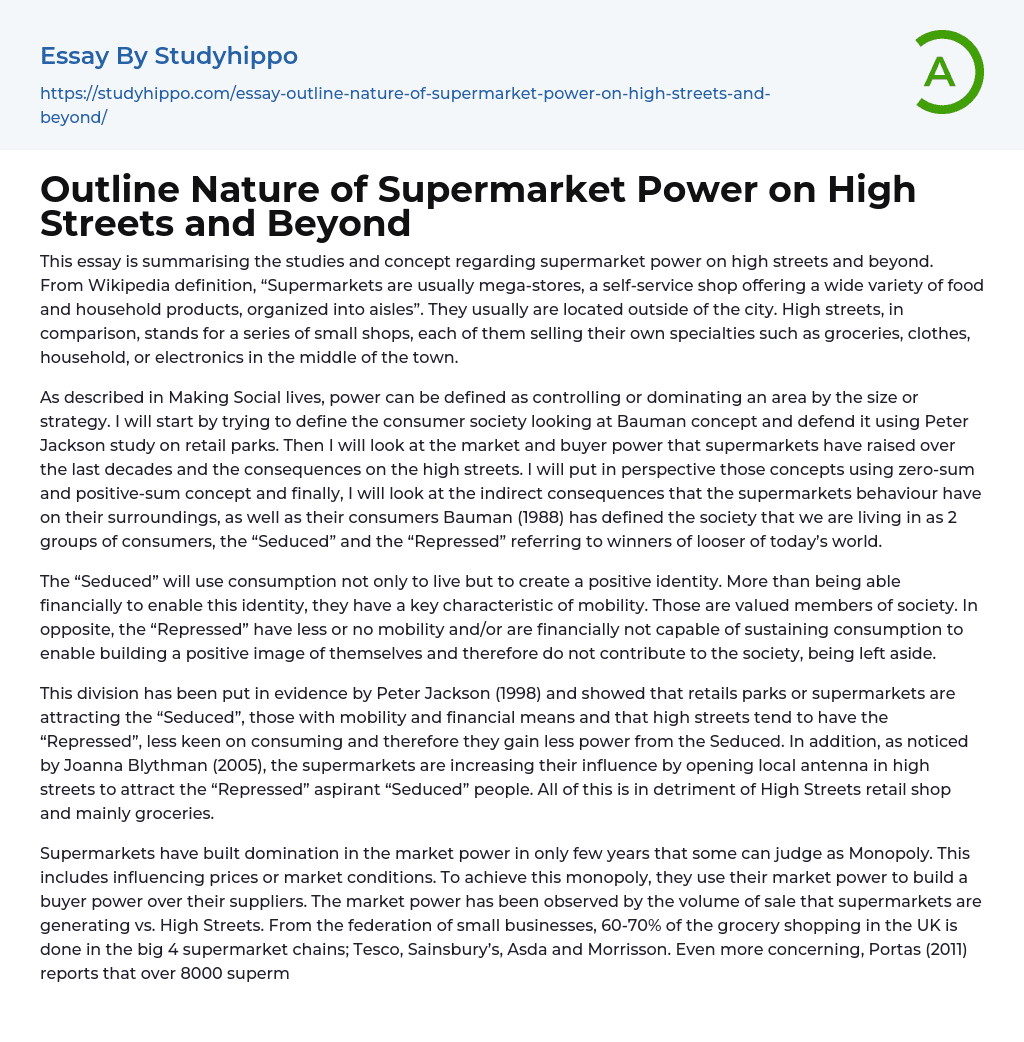

Outline Nature of Supermarket Power on High Streets and Beyond Essay Example
This essay will explore the impact of supermarkets on high streets and their surrounding areas. According to Wikipedia, supermarkets are spacious self-service stores that offer various food and household items arranged into aisles. Generally, these supermarkets are located away from city centers. Conversely, high streets consist of small shops in town centers that specialize in specific products like groceries, clothing, household goods, or electronics.
The text discusses the concept of power in "Making Social lives," defining it as the control or domination of an area through size or strategy. It explores the idea of a consumer society, drawing on Bauman's ideas and Peter Jackson's study on retail parks. The increasing market and buyer power of supermarkets are examined, along with their impact on local high streets. The concepts of zero-sum and positive-sum are discussed to provide perspectiv
...e. Additionally, the text explores the indirect consequences of supermarket behavior on their surroundings and consumers. Bauman (1988) categorizes society into winners ("Seduced") and losers ("Repressed").
The "Seduced" use consumption not only to survive, but to establish a positive identity. They have the essential trait of mobility and are considered valuable members of society. On the other hand, the "Repressed" lack mobility or financial capability to sustain consumption and create a positive self-image, thus being excluded from society.
Peter Jackson (1998) has emphasized the division between retails parks or supermarkets, which attract the "Seduced" - those who have mobility and financial means, and high streets, which tend to have the "Repressed" - those who are less interested in consuming and therefore have less power compared to the Seduced. Furthermore, as Joanna Blythman (2005) has
observed, supermarkets are increasing their influence by establishing local branches on high streets to attract aspiring "Repressed" individuals from the Seduced group. Consequently, this shift has a negative impact on retail shops on high streets, particularly those selling groceries.
Supermarkets have quickly gained complete dominance in the market, which could potentially result in a monopoly. This level of control allows supermarkets to manipulate prices and market conditions by exerting power over their suppliers. The extent of this control is evident in the significant sales generated by supermarkets compared to traditional shopping areas. According to the federation of small businesses, four major supermarket chains—Tesco, Sainsbury’s, Asda, and Morrisons—make up 60-70% of grocery shopping in the UK. What is even more concerning is that Portas (2011) claims that over 8000 supermarkets account for 97% of all grocery shopping in the UK.
The closure of small stores in high streets is happening rapidly as shown by the graph. It illustrates a decline in stores, ranging from 8% to 51% (depending on the specialty), since 2001. However, superstores have experienced a 35% increase. These statistics challenge the belief that supermarkets only harm high streets. Instead, according to Wrong (1997), there is a more nuanced perspective suggesting that the impact of supermarkets can be seen as either zero-sum or positive sum. A zero-sum situation would involve balancing gains and losses for all parties involved or even resulting in an overall loss.
The debate between supermarkets and high street shops is a common one, as argued by critics like Tescopoly. The Partick-Linwood example discussed in Making Social Lives (p61) showcases both perspectives. In Partick, the local community believes
that the arrival of a Tesco superstore will have negative repercussions on small retail shops in the town center. However, in Lindwood, the situation is viewed positively as the superstore would bring employment opportunities and attract visitors, ultimately revitalizing the struggling town center.
Supermarket power over High Streets cannot be generalized, as the consequences vary for each situation. However, it is undeniable that supermarkets possess market power and buyer power, resulting in two types of consumers: the Seduced and the Repressed. While this power is often viewed as having a negative impact, some argue that supermarkets also have a positive impact, known as positive sum. This includes revitalizing abandoned areas and improving the quality of life in countries with high poverty rates by creating jobs and bringing prosperity.
- Advertising essays
- Audience Theory essays
- Competitor Analysis essays
- Consumer essays
- Marketing Management essays
- Marketing Mix essays
- Marketing Plan essays
- Marketing Research essays
- Marketing Strategy essays
- Point Of Sale essays
- Price essays
- Procurement essays
- Product essays
- Product Differentiation essays
- Promotion essays
- Promotion And Marketing Communications essays
- Retailing essays
- Trademark essays
- Anheuser-busch essays
- Brands essays
- Detergent essays
- Product Placement essays
- Research Design essays
- New Product Development essays
- Advertisement essays
- Brand essays
- Sales Promotion essays
- Advertising campaign essays
- Consumer behaviour essays
- Offer And Acceptance essays
- Wal-Mart essays
- Discover essays
- Accounting essays
- Andrew Carnegie essays
- Automation essays
- Business Cycle essays
- Business Intelligence essays
- Business Model essays
- Business Operations essays
- Business Software essays
- Cooperation essays
- Cooperative essays
- Corporate Social Responsibility essays
- Corporation essays
- Customer Relationship Management essays
- Family Business essays
- Franchising essays
- Harvard Business School essays
- Harvard university essays
- Human Resource Management essays



